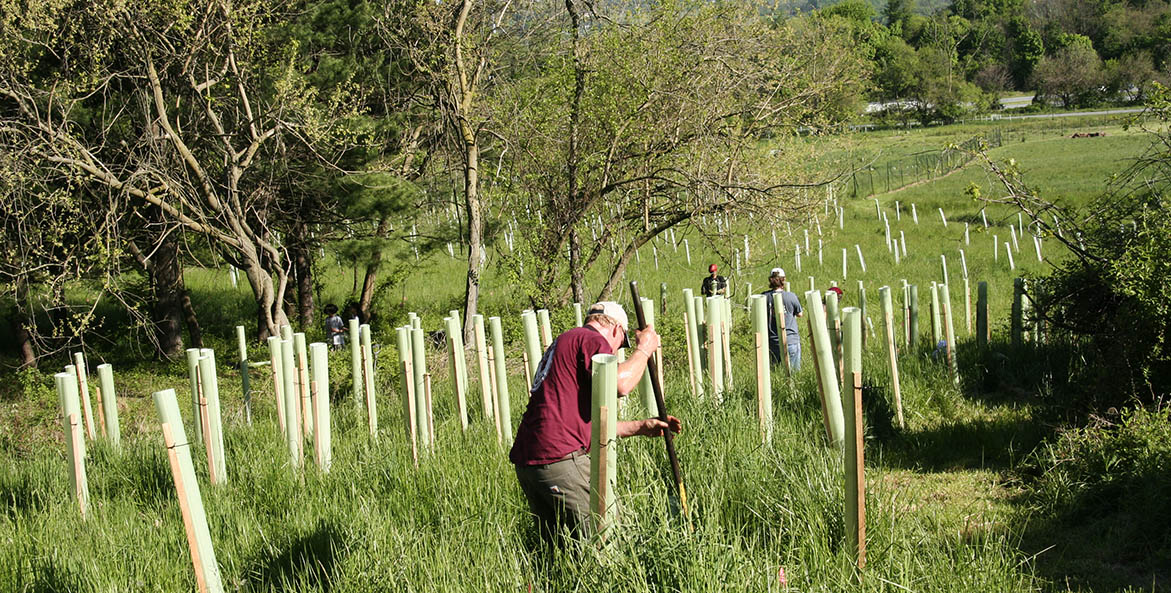This article was originally published in the Bay Journal on March 9, 2023.
“You are what you eat,” the old adage goes. Now, many are saying, “You are what your food eats.”
The way we produce food has profound consequences for the health of our communities, our environment and our local economies. Unfortunately, the status quo isn’t working for us or our environment. We’re losing our most productive soil, degrading our waterways with pollution and producing significant amounts of climate-warming greenhouse gases.
Agriculture, which covers approximately one-third of the Chesapeake Bay’s 64,000-square-mile watershed, is the second largest land use in the watershed. And it is the biggest source of pollution for local waterways. We can’t restore local rivers, streams and the Bay without reducing pollution from agriculture.
The way we produce food has profound consequences for the health of our communities, our environment and our local economies. Unfortunately, the status quo isn’t working for us or our environment.
Many farm communities are struggling, too, as farmers age and farmland gives way to housing developments, data centers and distribution warehouses. Moreover, research suggests the nutritional value and diversity of the food we grow is declining—at a time when chronic diseases linked to diet, such as obesity and heart disease, are reaching epidemic levels.
We have an imperative to do better, and we can do better. Congress this year is deliberating on the most influential agricultural legislation in the nation: the Farm Bill. Renegotiated roughly every five years, the Farm Bill has far-reaching impacts on farm communities and the way food is grown and, in turn, on the quality of our waterways. It covers major programs like crop insurance, as well as key conservation programs that help farmers reduce pollution.
Increasing Farm Bill funding for conservation programs is critical. They are currently oversubscribed, meaning the funds fall short of the demand from farmers who want to implement conservation practices. Nationwide, according to the Institute for Agriculture and Trade Policy, roughly seven out of 10 applications that farmers submitted in 2020 for Environmental Quality Incentives Program (EQIP) projects were not funded. In Pennsylvania, the Bay state that is furthest behind in reducing agricultural pollution, eight out of 10 were unfunded.
Separately, the U.S. Department of Agriculture can jump-start progress in Pennsylvania and other Bay states by making bold investments in the Chesapeake Bay States’ Partnership Initiative that it created last year, which aims to increase conservation funding for this region.
In addition, policy changes in the Farm Bill are needed so these programs work for our communities and our environment, not against them.
A shift to regenerative agriculture is one of the most-effective solutions to achieve multiple environmental and societal benefits. Regenerative agriculture is a holistic, systems approach to farming focused on building healthy soil—the foundation of all farm productivity.
Instead of degrading the land or simply maintaining its current state, regenerative practices work together to build up the land’s ability to hold and filter water; produce nutrient-dense food; enhance ecosystem biodiversity; actively store carbon; and withstand floods, droughts and other extremes linked to climate change.
Many of these practices also help farms cut costs and become more resilient to environmental and economic shocks. They do so by reducing the need for costly chemical inputs like fertilizers and pesticides, diversifying crops and revenue streams, and buffering the impact of extreme weather.
Many federal agricultural programs aren’t set up to support regenerative farming, disproportionately serving conventional agriculture instead. For example, Congress initially prohibited Concentrated Animal Feeding Operations from accessing EQIP funds, but the law was changed in 2002 to allow their participation. Today, annual expenditures on animal waste storage systems on confined livestock operations are among the highest of all funded practices, according to the nonprofit Environmental Working Group. Congress can help address this imbalance by increasing incentives for regenerative farms in EQIP, the Federal Crop Insurance Program and the Conservation Stewardship Program.
A lack of technical assistance and outreach is most often the pinch point preventing the effective deployment of conservation practices on farms. An increase in funding for technical assistance is essential, especially for facilitating a shift to regenerative agriculture. This would allow more trained staff to work with farmers one-on-one to plan and implement conservation practices. Experts in areas like soil health management are needed to assist farmers who want to move toward regenerative operations, which rely on combinations of practices working together.
In addition to funding, it’s important to increase technical assistance capacity, to build out the pipeline of conservation professionals. Congress should direct the USDA to establish and expand partnerships with educational institutions, including community colleges, land-grant universities and historically Black colleges and universities, to educate and train the next generation of technical assistance providers.
Shifting the way we grow food isn’t easy. Legislators and policymakers, however, can remove barriers and make it possible. Doing so will improve water quality, reduce greenhouse gas emissions and increase the resilience of farms amid climate change, provide economic benefits to rural economies and help this generation of farmers steward the land for the next.




